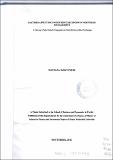| dc.description.abstract | ABSTRACT
The purpose of this study was to investigate the factors affecting investment decisions in portfolio management for the listed companies and market participants in Nairobi securities exchange. Sixty four companies were listed at the NSE and 19 market participant in NSE. The most striking problem faced by NSE is it operation on trading decision for the securities with insufficient desirable characteristics of stock exchange market. These securities are faced by liquidity problem, non-availability of information which led to market anomalies. However, this led to high price sensitivity to new market information, price fluctuation and narrow price spread. The theoretical anchors for the study were traditional and behavioural finance theories which include modem portfolio theory, market hypothesis theory, Frame Dependency Utility Theory and prospect theory. The theories helped to understand investment decisions in portfolio management based on following variables which include risk tolerance, investors' prospect, market information and tax exposure. The theories helped to understand investment decisions in portfolio management, based on the amount of risk and other issues in which individual is willing to take. Relevant literature was identified and organized in themes of the study variables to make questionnaires which were used to conduct the investigation. Random sampling technique and purposive technique were used to obtain a sample of 62 (out of 83) investment advisers and managers to be used in this study. These techniques were considered most powerful tools that gave the required investment advisers and managers of the listed companies and market participants an equal chance at the NSE. A logistic regression was used and hypotheses were tested at significance level of 95%. The data was collected and analysed using descriptive design technique to give a vivid explanation for various factors influencing decision in portfolio management. The results obtained indicate that many people were receptive about risk. The more risk taken is warranted with corresponding gain and the reverse is true. Also investor prospect significantly affect decisions because many people may prepare short term investment due to the pressure to meet immediate demand. It was considered as a reasonable assurance from these knowledgeable advisers who had financial market information through share price analysis, future financial security valuation, and recommendations from stock brokers in such that security managers should concentrate on a well balanced portfolio creation to caution investors from losses. After high profit realization, it is paramount for investors to take time to compute risk analysis before embarking on investments. Investing in the shares should be done under a guidance of highly qualified stock managers. Finally, similar research should be carried out in areas far away from Nairobi Securities Exchange in order to observe investor disposition effect and risk attitude. Conducting the same research for Non¬listed companies in which their shares are not traded publicly, can also give foresight about investors' behaviours in unregulated market. | en_US |

